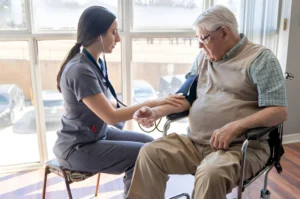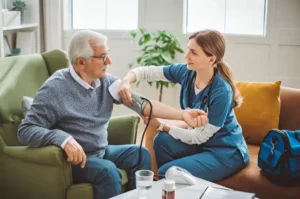When it comes to caring for a loved one at home, understanding the Most Common Diagnosis for Home Health Care can help you recognize when it’s time to consider extra support. Home health care is a thoughtful package where comfort, independence, and personalized attention come together. It’s not just about providing convenience — it’s about ensuring your loved ones receive the right kind of care in a safe, familiar environment. But what health conditions typically lead families to seek this option in the first place? In this blog, we’ll explore what home health care truly means, the most common diagnoses in home health care, and how DHcare is here to assist every step of the way.
What Is Home Health Care with DHCare?
Home health care is a service specifically for the elderly or disabled people who need help with their daily life activities. The best part about it is that patients can receive it from the comfort of their own homes. This allows them to receive personal or medical care without moving to an unfamiliar facility. Home health care agencies provide numerous services, such as assistance with daily activities, skilled nursing, physical therapy, and companionship.
At DHCare, we know the challenges families face when their loved ones are struggling. So, we designed our services in such a way that will cater to both your and the patients’ needs. They will receive the care required while being surrounded by comfort and familiarity.
Why a Diagnosis Matters in Home Health Care?
If you are considering home health care, the first thing that you should pay attention to is the patient’s medical condition. It is important to know the diagnosis because the type of care they need is dependent on this. Not only that, but it also impacts the type of healthcare professionals required, the service duration, and insurance eligibility.
For example, someone recovering from surgery needs short-term support like physical therapy and skilled nursing to regain strength. However, a patient with a chronic condition will need long-term and regular assistance with daily activities like bathing and eating.
So, healthcare providers can customize the care plan for their patient’s needs based on their specific diagnosis. This will ensure that their personal, emotional, and medical needs are addressed.
5 Most Common Diagnosis for Home Health Care in 2025
So, in-home health care, some common conditions can be treated in the comfort of one’s home. Some of those diagnoses include:
1. Heart Disease
Heart diseases consist of numerous health conditions that lead to different kinds of symptoms. This includes difficulty in breathing, fatigue, and irregular heart rhythms. So, for patients who suffer from heart disease, home health professionals will regularly check vital signs. For example, heart rate, blood pressure, and oxygen levels. They also make sure medications are taken on time and in accurate dosages.
2. Diabetes
The caregivers also tend to diabetes management. They offer constant attention to things like diet, medication, and blood sugar levels. Home health care is specifically very beneficial for individuals with diabetes. This is because they strictly supervise whether insulin injections or oral medications are being taken properly. It lowers the risk of diabetes from getting out of hand.
3. Chronic Obstructive Pulmonary Disease (COPD)
For people with COPD, it is hard for them to breathe and carry out their daily activities. So, home health caregivers check if oxygen is being delivered correctly. They also monitor its overall usage. Additionally, the caregivers provide breathing exercises and techniques. This helps improve lung function and soothes shortness of breath.
4. Dementia and Alzheimer’s Disease
People who suffer from chronic and progressive conditions like Dementia and Alzheimer’s struggle with impaired memory and cognition. So, they are unable to perform their daily tasks. Home health care aides help to ensure that the patients don’t wander off. They also assist with movement and offer supervision during any activity. Some specialized caregivers provide patients with memory exercises and other activities to maintain cognitive function.
5. Stroke Recovery
After a stroke, patients usually struggle physically, emotionally, and cognitively. All of these need elaborate rehabilitation facilities for the patient to recover. Home health caregivers cater to this need by providing physical, occupational, and speech therapy. These help the patients regain their strength and communication skills to make their recovery process easier.
How DHCare Tailors Care to Each Diagnosis
What sets DHCare apart is our personalized care services. We begin by conducting an in-depth consultation process to find out the patient’s medical history, current diagnosis, and family preferences. Based on all of this, we come up with a care plan and match our caregivers with the patient.
So whether your loved one is suffering from a chronic illness or is recovering from surgery, DHCare will make sure they are receiving the right kind of support. Our caregivers work closely with the patient, their families, and the physicians.
Medicare, Medicaid, and CDPAP/CDPAS Coverage
If you need help finding home health care for your loved one, multiple options will make the process easier. Programs that offer financial assistance include:
Medicare
Medicare offers coverage for things like skilled nursing and therapy services. It is only applicable to homebound individuals who meet certain medical criteria. Medicare is mostly used after hospitalization or for any ongoing treatment for a chronic condition.
Medicaid
Comparatively, Medicaid provides broader coverage, particularly for individuals who need long-term care. However, the eligibility requirements for Medicaid is different state by state. Other than this, this program is designed to help low-income people to access home care.
CDPAP/CDPAS
The Consumer Directed Personal Assistance Program (CDPAP) is a Medicaid program that allows families to hire anyone of their choice as personal caregivers. So, it gives the patients control over who provides the care services. This will reassure the families that their loved ones are in trusted and familiar hands.
When to Consider Home Care with DHCare?
It may not always be easy to know when home health care is necessary. However, some of the warning signs that home health care is needed are:
- If someone is struggling with their daily activities, such as walking, dressing, or eating
- When an individual needs frequent hospital visits or trips to the emergency room
- If someone has memory issues due to which there are safety concerns
So, if you notice any major negative health signs where your loved ones need constant supervision and assistance, then DHCare is here to help. With our home health care services, your loved ones will get to live in the comfort and familiarity of their own home while receiving the care they need.
Conclusion
Overall, choosing the right caring services for an aging or sick family member is one of the most important decisions you will ever make. Home health care provides a range of services. However, this depends on the diagnoses the patients have.
The most common diagnoses found in home health care are heart disease, diabetes, dementia, post-stroke recovery, and more. Now, with the help of DHCare, both you and your loved ones are guaranteed trusted and personalized services.
FAQs
What diagnosis qualifies for CDPAP in NY?
Individuals with chronic conditions such as Alzheimer’s, Parkinson’s, and other disabilities who require constant help with daily activities are qualified for CDPAP in NY. The patients also need to have Medicaid.
Can my loved one with Alzheimer’s receive home care?
Yes, people suffering from Alzheimer’s can receive home health care. Patients will receive services such as assistance with daily activities and personal care based on their specific needs.
How does DHCare match caregivers to specific diagnoses?
DHCare matches caregivers by looking at the patient’s specific medical needs. They also evaluate the caregiver’s experience and training. This will ensure that the patient receives appropriate and specialized care.




